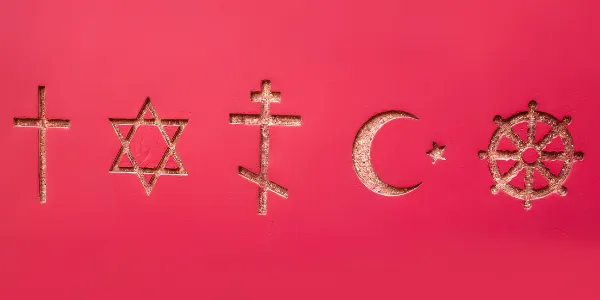Blog

The Importance of Interfaith Connection
"The power of interfaith connection lies in its ability to transcend the boundaries of individual faiths and biases, promoting understanding, connection, and collective action."
The Importance of Interfaith Connection
Building peace can take on many different approaches, but one that the Pono-Pono Peace Initiative is particularly passionate about is interfaith collaboration. Connecting with individuals from diverse faith backgrounds allows us to find common values, learn from different perspectives, and create lasting relationships.
Religion offers great depth and purpose to an individual's life, serving as a guiding beacon through both the good and challenging times. Religious beliefs can provide understanding, direction, and even correction when needed. As a result, people of faith are often deeply passionate about their beliefs, and eager to share how their spiritual traditions have helped and aided them.
This is where the beauty of interfaith connection lies. By coming together, we have the opportunity to learn from each other's sacred texts, religious values, and unique practices. This learning process is highly individualized, helping to broaden our understanding of our own religion and life experiences. Through this growth and exchange, we often identify similar values and practices across faiths, further deepening the connection and relationship between interfaith groups.

Spiritual learning is a lifelong pursuit, and gathering as members of different faiths allows us to share helpful passages and principles from our sacred texts and sermons. Whether it's the Quran, Torah, Bible, or any other sacred scripture, each offers invaluable insights that can inspire and deepen our understanding of what truly connects us as people of faith.
Interfaith collaboration not only promotes mutual understanding and tolerance but also encourages peaceful coexistence. When people of diverse faiths come together, it becomes a practice of learning to live together in harmony and peace, setting an example for society. These interfaith spaces provide platforms for open and respectful discussions, where participants can share their beliefs, practices, and perspectives, leading to greater mutual understanding.
Moreover, interfaith initiatives can help combat religious extremism and intolerance. By building bridges between faiths, we can start to address and heal from historic religious discriminations and misunderstandings. Interfaith connections can also bring communities together during times of crisis, providing a safe space of support and solidarity that can help overcome challenges and promote healing and connection.

Beyond fostering understanding and unity, interfaith collaboration can also contribute to social justice and human rights. Many religious and spiritual traditions share common values of compassion, justice, and human dignity. By working together, interfaith groups can amplify these values and advocate for positive social change.
When individuals from diverse religious backgrounds come together in service of the greater good, a special feeling of unity and purpose emerges. Whether responding to a natural disaster, addressing a community need, or supporting another faith's request, this interfaith collaboration inspires and connects people at a deep level, enabling change that would not be possible otherwise. The combination of passion and commitment from different faith groups united in a common cause, is truly magnificent to witness.
Studies have shown that individuals who pray daily and attend weekly religious services tend to volunteer more of their time to help their community and donate more to charitable efforts compared to the average American (Pew Research Center, 2016). This highlights the positive ways in which religion can foster a spirit of selfless service and connection. When these efforts are amplified through interfaith collaboration, the impact of individual volunteering and donations becomes even more powerful and far-reaching.

Interfaith connection has the ability to transcend the boundaries of individual faiths and biases, promoting understanding, and compassion, and creating collective change. As diverse religious communities come together to tackle shared challenges, they can leverage their unique perspectives, shared resources, and collective influence to create meaningful and lasting change that wouldn’t be possible otherwise.
In an increasingly interconnected world, interfaith connections can contribute to a greater sense of global community and cooperation in addressing humanity's shared challenges. Through community and global efforts, faiths can share successful models, strategies, and resources that can help address important needs and foster a deeper sense of collaboration around the world.
The power of interfaith connection lies in its ability to transcend the boundaries of individual faiths and biases, promoting understanding, connection, and collective action. As we continue to navigate the complexities of our world, the importance of building meaningful relationships across religious divides cannot be overstated. It is through this process of learning, sharing, and collaborating that we can truly build lasting peace.
